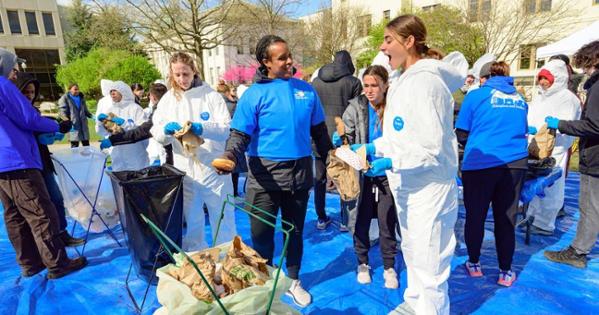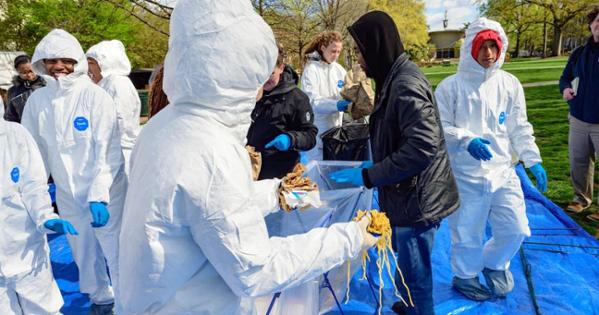Digging Through Trash is Not a Waste
 Photos by Jeff Watts.
Photos by Jeff Watts.
Waste audits are not for the faint of stomach.
The odor is foul. The work is unglamorous. But the purpose behind digging through dozens of trash bags of waste by hand is essential to American University’s sustainability work.
“My initial reaction was, ‘This is gross,’” said Jasmin Sorrell, SOC/BA ’26, a center back for the AU women’s soccer team. But, then the she realized, “Someone has to do this. Realizing what goes in what bin ensures [other] people won’t have to do this.”
 As part of Campus Beautification Day on April 8, Sorrell, her teammates, and other students and staff got their hands dirty sorting through 315 pounds of trash during a waste audit of the Mary Graydon Student Center’s first and third floors.
As part of Campus Beautification Day on April 8, Sorrell, her teammates, and other students and staff got their hands dirty sorting through 315 pounds of trash during a waste audit of the Mary Graydon Student Center’s first and third floors.
Each month, AU’s Zero Waste Office performs waste audits—hand sorting through trash, recycling, and compost collected over 24 hours at a different campus building. The exercise ensures that incorrectly sorted items are placed in the proper bins and assesses how well AU is diverting waste from the landfill.
At the start of last week’s audit, 87 percent of waste had been placed in the trash, 7 percent was in the compost bin, and 6 percent was in the recycling. After sorting Panera Bread mac and cheese, Pepsi cups, Qdoba bowls, water bottles, and paper towels, however, only 20 percent was actually trash. The bulk of the waste—68 percent—was compostable, while 13 percent was recyclable.
“The biggest takeaway is that a huge amount of compost is being thrown away in [MGSC],” said zero waste manager Caroline Boone. “Because [MGSC] is such a large, single-point source of waste, figuring out how we can get that waste sorted more effectively has the potential to have a very large effect.”
In 2010, AU adopted a Zero Waste Policy to reduce campus waste and divert the university’s waste stream from the landfill. By 2030, the university aims to achieve zero waste, diverting 90 percent of its waste.
 Graphic by Jaylene Arnold.
Graphic by Jaylene Arnold.
With a current waste diversion rate of 41 percent—up from 30 percent in 2023—AU composted 153 tons of food waste last year, an increase of 340 percent from 2023.
“AU remains committed to thinking deeply about its environmental impact and doing the hard work to ensure we’re being responsible about campus waste,” said Bronte Burleigh-Jones, Kogod/BS ’91, MBA ’93, CFO, vice president, and treasurer. “I am proud of how efforts by the Office of Sustainability, the Facilities Management Zero Waste Office—and the entire AU community—have resulted in steady incremental progress toward reaching our ambitious campus sustainability goals.”
Education is a key benefit of regular waste audits, providing a deeper understanding of the importance of a split-second decision that thousands of Eagles make across campus every day.
 “People don’t have ill intentions. It’s just that often you walk up to a bin, and you don’t think about it,” Boone said. “Having someone get involved with a waste audit personally tends to help trigger more of that conscious thought.”
“People don’t have ill intentions. It’s just that often you walk up to a bin, and you don’t think about it,” Boone said. “Having someone get involved with a waste audit personally tends to help trigger more of that conscious thought.”
After taking part in the work with her team, head coach Marsha Harper said she’ll think twice the next time she throws something away, including when she stops by Halal Shack for falafel.
“If we call this place our home, we have to make sure we’re taking care of it,” Harper said. “It’s no different than keeping our locker room clean. Campus is our home and collectively, globally, earth is our home. Making sure we have an eye for that is a small piece of a bigger good.”